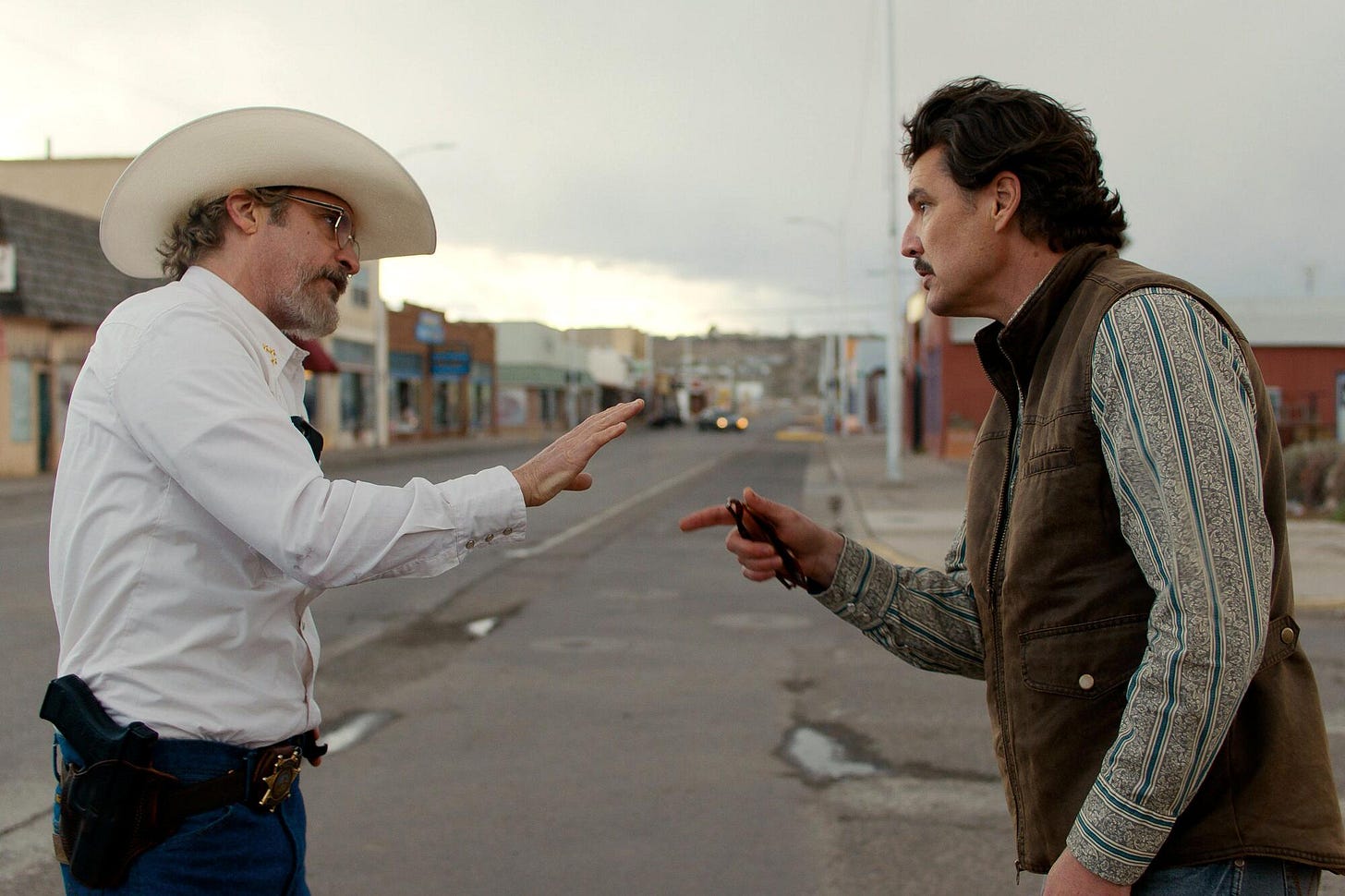The internet pours gasoline on cultural fires in ‘Eddington’
Ari Aster’s darkly comedic Western takes on COVID-era paranoia and American disarray.
I still don’t know if I like Eddington. Watching it was frustrating, almost certainly by design. Ari Aster’s latest is a brash, often baffling, deeply uneasy modern Western that swings from brilliant to bewildering. And yet, I haven’t stopped thinking about it. It’s been a week since I saw it, and I’m still sifting through its layers of paranoia, satire and political commentary in an effort to understand what, exactly, Aster is trying to say about modern America.
Set in a tiny New Mexico town during the early days of the COVID-19 pandemic, Eddington follows Sheriff Joe Cross (Joaquin Phoenix), a man bewildered by mask mandates and social distancing rules in a place where the virus has yet to appear. The town’s mayor, Ted Garcia (Pedro Pascal), seems to relish his newfound power under pandemic restrictions, all while quietly advancing plans for a massive data center that many locals fear will damage the environment. Tensions between the two men are already simmering, rooted in whispers of a murky past involving the mayor and Joe’s reclusive wife (Emma Stone). When the two clash publicly over grocery store mask rules, Joe retaliates by announcing a mayoral campaign that is quickly fueled by conspiracy theories and the constant stream of online paranoia emanating from his mother-in-law’s YouTube habit.
This isn’t a full review — Perry and I will dig into Eddington soon on We’re Watching Here — but I wanted to share my initial impressions. Frustrating as it is, I suspect that’s the point. Aster uses this story of a fraying town as a microcosm for America’s 2020: a time when trust collapsed, information overload surged, and social cohesion gave way to tribalism, hysteria, and performative outrage. The film is deliberately overwhelming, crammed with incident: mask debates, COVID testing sites, Black Lives Matter protests, QAnon-adjacent conspiracies, religious opportunists, and satirical jabs at youthful activism and liberal smugness.
It’s messy, loud and at times overstuffed. Aster’s satire often shouts instead of whispers. And his refusal to clearly signal his own views on public health measures or politics will frustrate audiences across the spectrum. Left-leaning viewers may bristle at following a protagonist who’s skeptical of COVID protocols; Joe is portrayed as calm and sympathetic early on, even as he spirals into internet-fueled mania. Meanwhile, Pascal’s smiley, progressive mayor isn’t spared either; he’s charming, yes, but self-serving and eager to flex his authority. It’s a film that distrusts everyone.
But that disorientation is a feature, not a bug. Eddington captures the ambient chaos and contradictory information that defined 2020, when each day brought new rules, new outrage and new reasons to distrust your neighbors. There are moments that feel eerily familiar: a shouting match over masks in a grocery store, a long line at a pop-up COVID test site, a well-meaning teen awkwardly sermonizing on white privilege. At times, Aster teeters toward South Park-style both-siderism — everyone is hypocritical, and everyone has an agenda. The sheriff wants revenge and control; the mayor wants legacy and leverage; protestors want justice, but some just want attention. And looming behind it all is the sense that someone, somewhere, is pulling strings.
Ultimately, Eddington isn’t really about COVID or politics, but it uses them as vehicles to explore the deeper virus: a collective unraveling driven by ego, fear, and alienation. Few characters are driven by actual convictions. Joe’s crusade begins not with belief, but humiliation. His descent is personal as much as political; his marriage is failing, his pride is wounded and the internet offers easy answers. Garcia loves the performance of leadership more than its substance; his socially distanced backyard bash set to “Firework” is a masterclass in pandemic-era virtue signaling. Even the protestors are a mixed bag — some sincere, others just hoping to impress their crush.
What the film captures best is how isolated people, already on edge, can be pushed over by algorithmic fear and digital misinformation. Nearly every major plot turn is preceded by someone doomscrolling or watching a video. Social media isn’t just a backdrop; it’s the accelerant, spreading panic, lies and false solidarity. By the time a shadowy group of “antifa” activists arrives on a private jet — sent by whom, exactly, is a question left ominously open — it’s clear that the town has lost its grip on reality. And maybe that’s the idea: Eddington suggests that in a world dominated by curated feeds and viral videos, truth doesn’t stand a chance.
Its final image lingers as the credits roll. So does the question: Who benefits from the chaos?
I’m still unsure whether Eddington is a great movie or a beautiful mess. But I do know it’s one of the few recent films that genuinely grapples with the psychological and cultural fracture of pandemic-era America. It may be frustrating. But it’s also, undeniably, fascinating. Stay tuned for the podcast next week — we’ve got a lot to talk about.



